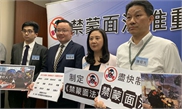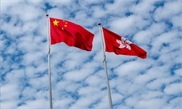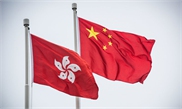Enacting anti-mask law is legitimate move, echoing global practice
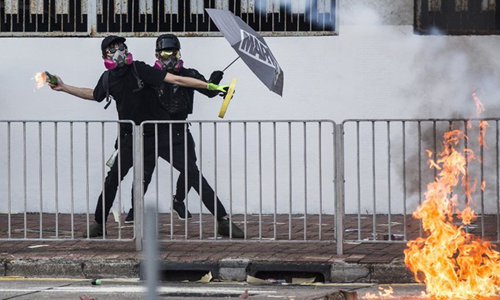
Photo: AFP
Enacting an anti-mask law is in line with global practice and a legitimate move which would help Hong Kong SAR government deal with spiraling violence and riot, which are leading the city into the abyss, legal experts and government representatives say.
Hong Kong SAR Chief Executive Carrie Lam Friday invoked emergency powers to enact a law banning face masks at public assemblies. The law, which takes effect on Saturday, is expected to help quell months of anti-government violence and chaos in Hong Kong.
The new rule forbids people at public assemblies to hide their identity with face masks or other shades. Any person who violates the law faces up to one year in jail and a fine of HK$25,000 ($3,188). The Ordinance comes with some exceptions.
Announcing the new law to reporters, Lam said, "We must stop the violence."
"It's not an easy decision to ban masks, but a necessary one. However, it does not to say Hong Kong is in a state of emergency," Lam said at a press conference Friday.
Over the past few weeks, Hong Kong has been experiencing escalating violence, which is now destroying Hong Kong, and what the government should do is to stop the violence, she added.
"We hope this new law would deter young protesters and keep them away from violence," said Lam.
Legitimate move
While some observers raised questions about whether enacting anti-mask law without going through the LegCo is legitimate move, prominent legal representatives consider it justified and necessary.
"If the chief executive (CE) consider it an emergency or public danger, the CE may implement any regulation which she may consider in the public interest," prominent lawyer Kennedy Wong Ying-ho told the Global Times.
Lam noted that Hong Kong faces serious danger, which is among the conditions in the Emergency Regulations Ordinance.
Ronny Tong Ka-wah, Hong Kong Senior Counsel, told the Global Times Friday: "We do not necessarily have to follow usual legislative procedures, considering LegCo has suspended its sessions."
"In terms of law enforcement, the law will be implemented to protect the public interests, not individual interests," Tong said.
The Hong Kong LegCo Complex was severely damaged by the black-clad mobs on July 1. The rioters smashed the windows and stormed in, occupying and vandalizing the LegCo chamber. The protesters sprayed slogans on the walls, damaging official portraits and symbols, and damaged surveillance cameras.
Reputation intact
As some raised questions about whether invoking emergency powers would affect the global reputation of Hong Kong as a major business and trading hub, Paul Chan Mo-po, Financial Secretary, said Hong Kong won't use emergency law to enforce foreign currency controls.
The law is a piece of subsidiary legislation subject to negative vetting. Because LegCo will reconvene on October 16, the law will be submitted for deliberation.
On whether the Hong Kong government will impose a curfew, Lam said that her government will review all measures to stop the violence, and that the government is determined to do so.
Hong Kong's reputation as an international business center has already been hurt, "and it is vital to take measures to stop the violence, or else investors won't dare to step into Hong Kong," Nixie Lam, Tsuen Wan district councilor, told the Global Times Friday.
"No business can guarantee the safety of their staff at this stage, and people are rushing home to avoid protesters. I strongly believe it's necessary to have this law and hopefully ease the situation," she said.
Echoing global practice
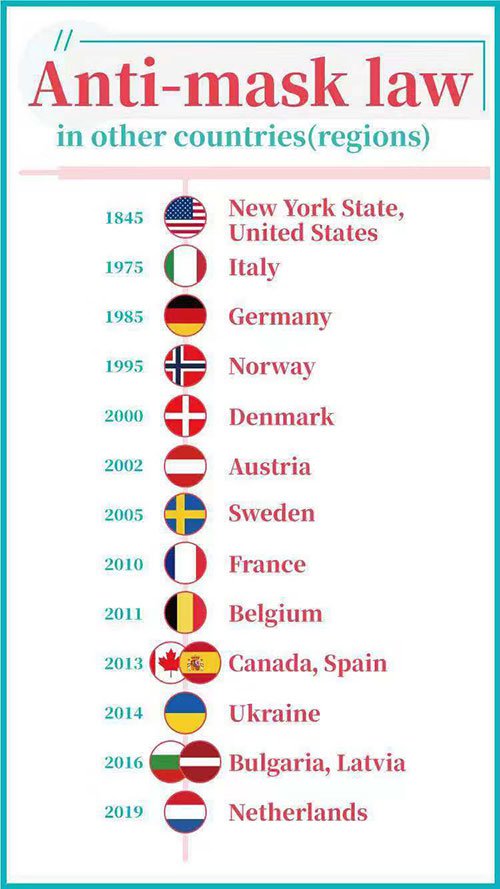
Anti-mask law enacted by other countries & regions
During the press conference, Lam said that forbidding people from wearing face masks will not suppress Hong Kong residents' freedom of speech, as the law applies to people marching illegally and violently, and is aimed at rioters.
The Hong Kong Education Bureau sent a letter Friday afternoon to the principals of all schools and universities in Hong Kong and demanded that they remind students not to wear masks on or outside campus.
A number of countries have banned masks during demonstrations, and the anti-mask law is in line with global standards, according to analysts. For instance, France, which suffered from the yellow vest movement, "signed a law giving security forces greater powers to deal with demonstrations," AFP reported in April this year.
It gives authorities the power to ban from demonstrations any individual who "poses a particularly serious threat to public order," according to the AFP report.
France's Constitutional Council also made covering the face at a protest a criminal offense, imposing a one-year jail sentence and a fine of 15,000 euro ($17,000).
The Canadian Parliament introduced Bill C-309 in 2013, prohibiting the wearing of masks in a riot or other unlawful assemblies.

